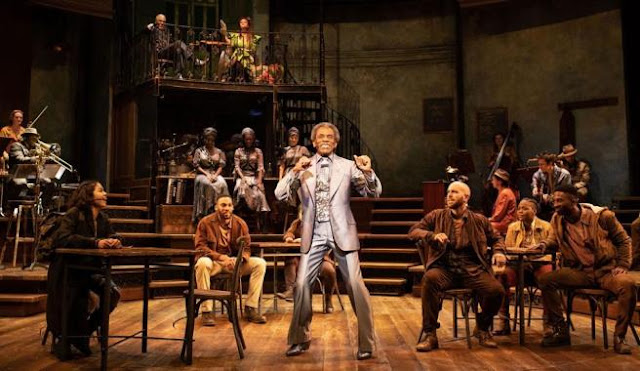Theater Review: Hadestown Disappoints on its Journey to Hell
Music, Lyrics, and Book by Anaïs Mitchell
Directed by Rachel Chavkin
Walter Kerr Theater, NYC
March 4, 2020
There’s been a recent flurry of media articles honoring the 90th birthday of Steven Sondheim, the great musical theater composer of works like Company, Sweeney Todd, and A Little Night Music. He’s a great example that you do not have to be a supreme melodist a la Richard Rogers to make a compelling musical. He hits just the right balance of literate words, contemporary plots, and sophisticated music with just enough hummable-ness to make the whole package work. But it turns out that it’s hard to do. I have only found a few musicals in the past two decades to be truly excellent: The Book of Mormon, Hairspray, and Dear Evan Hanson. Enter Hadestown, the Emmy winner from last year.
Hadestown is yet another popular musical with an interesting concept, but mediocre music that does not justify the question “why are these people singing?” These days most Broadway musicals (off-Broadway as well) seem to fall into the category of either familiar revivals (West Side Story, The Lion King), jukebox musicals (“greatest hits of Karen Carpenter, with some biography included”), or theme musicals such as Hadestown. The first two categories do not require new music. Unfortunately, few of the last type seem to come up with good music, and in that category I include Hadestown (also, Hamilton, Spring Awakening). Steven Sondheim, where are you?
Hadestown is a labor of love for writer/composer Anaïs Mitchell (b. 1981). It has been kicking around in regional theaters since 2007, finally reached off-Broadway in 2016, London in 2018, then finally Broadway, where it is now selling well (well, until it was shut down due to coronavirus). A very young audience populated the show on the Wednesday matinee I attended, nice to see. The teens in front of me did not seem all that engaged, though, with several regarding their IPhones during the performance (naughty, naughty). Hadestown retells the Orpheus/Eurydice legend, with big contributions from the parallel story of Hades and his wife Persephone. The setting is described in the flyer as “postapocalyptic-speakeasy”. Well, I guess. The opening does appear to be in a bar, and a central descending elevator platform takes characters down to the realm of Hades (here, “Hadestown”, at the end of the railroad). This is sort of a nightmarish company town with enslaved workers laboring all day, wearing S/M leather garb and sporting oiled muscles. Bar waiter Orpheus (he who charmed the savage beasts with his lovely voice) falls in love with foxy Eurydice, who stumbles into his bar, but she gets tempted to descend into Hadestown for better job opportunities, falling under the domination of the god Hades (a low basso). In order to get her back, Orpheus must descend into Hadestown, negotiate with boss Hades, and walk in front of Eurydice all the way back home, never looking back at her. He fails to do so, so she must return to her imprisonment in Hades. This update is clever, but the playwright never really justifies the point of updating this legend. There are attempts at modern relevance—the chorus “Why we Build the Wall” (about the wall around Hadestown) seems very relevant in this Trumpian “Build the Wall” era, and the oppressed workers of Hadestown have a class warfare vibe and seem oppressed even in their movements and demeanor. But the politics here are not quite pointed enough to justify 2 ½ hours on this scanty legend subject. The music is a mix of blues, rap, and some conventional pops styles—the composer seems most original with her folk and blues side--but none of the songs were hummable or memorable. I would call the music pleasantly inoffensive, which is certainly an improvement over the recent Cyrano I saw, and similar my impression of Hamilton. But still, it was a bit dull, as there was little wit or originality in the song lyrics or the book.
The lead characters were an oddly mismatched group. Orpheus (pop singer Reeve Carney) had pretty boy looks, but a ridiculous pageboy hair cut and a grating, very wide ranging (baritone to soprano) voice that unappealingly alternated between blandness, razor blades, and airiness. Eurydice (Eva Noblezada) was great, a dynamic spitfire with great stage presence. Amber Gray’s Persephone was the closest to a scene-stealer of anyone, with a big voice and good dancing. I also liked the really raspy low, projecting voice of Patrick Page as Hades. The mix of all these very high and very low voices was at times annoying to listen to, and I found myself wincing at some of Orpheus’ songs, not quite the response desired from the voice that tames the savage beasts. As befits a Broadway show, there were flashy lights, throbbing music played by coolly onstage performers, and edgy choreography that never really seemed like dance, but was also not really Hades-like. This was an overall disappointing musical, oddly empty of excitement for me, despite the flashy staging, smoke, and modern choreography. As often proven, nice packaging cannot hide a flawed core product.


Comments
Post a Comment